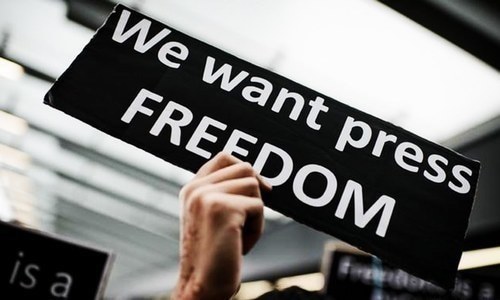UNITED NATIONS: A UN human rights panel has expressed its concerns over “an alarming pattern of restrictions” on freedom of expression in Pakistan, urging the government to allow journalists to exercise this right.
In two documents sent to the government of Pakistan, the panel informed Islamabad that it has received information concerning a series of “alleged meritless charges” brought against some journalists and human rights defenders.
The documents — signed by three rapporteurs, Irene Khan, Elina Steinerte and Mary Lawlor — were shared with the government of Pakistan two months ago. The complaints listed include cases which courts in Pakistan have dismissed as well as those in which prosecution or investigation is ongoing and some in which journalists were questioned or threatened but not prosecuted.
Concerns over alleged threats and intimidations against one of the journalists — Gul Bukhari — were first conveyed to the government on July 16, 2018 and the government responded to those complaints on Oct 5, 2018. “But we remain concerned about her situation given the new allegations received” since the complaint was filed, a note attached to the document said.
The case of another journalist, Asad Ali Toor, has also been highlighted. Mr Toor, an Islamabad-based journalist, has been charged with mischief, defamation and posting unlawful content. The government never provided details of the charges and later the Federal Investigation Agency cleared him before both the lower judiciary and the Lahore High Court, Rawalpindi bench.
Ajeeb Ali Lakho, a journalist from Sindh, was charged with illegal trade and smuggling of Iranian diesel following the publication of a report criticising the government. In 2019, Mr Lakho submitted a petition in all 21 cases, claiming that all the charges were “false and frivolous”.
After examining his petition, the Sindh High Court, Sukkur Bench, directed the respective courts to decide it on merit and Mr Lakho was ultimately cleared of all charges.
Rana Arshad Sulehri, an Islamabad-based journalist, was harassed by FIA officials after he wrote stories criticising the Musharraf government. FIA officials also asked him to appear before their investigators to clarify his position on the charges that were never disclosed. His home was also raided and searched without a warrant. Then Mr Sulehri filed a writ petition, forcing the FIA to withdraw the charges.
Bilal Farooqi, a human rights defender and editor of the Express Tribune news site, faced harassment for publishing reports on enforced disappearances. The charges included posting “highly objectionable material” and “highly provocative posts” on his Facebook and Twitter accounts. On Sept 11, 2020, he was arrested and is currently on bail.
Mian Dawood, a court reporter, was ordered in 2020 to appear before the FIA. He tried to challenge the notice, but the court refused to receive his plea, citing a lack of jurisdiction.
Amir Mir, a Lahore-based journalist, received a notice from the FIA on Aug 28, 2020, asking him to provide his source of information for reports he released on YouTube. Mr Mir has since appeared before the FIA on various occasions but has not yet been informed of any charges.
Absar Alam, an Islamabad-based journalist and former chairman of Pemra, had a case registered against him on Sept 11, 2020. The charges included abetting mutiny, sedition, defamation and public mischief.
Fakhar Durrani, another Islamabad-based journalist, was labelled a traitor during a live TV show and was accused of being an Indian agent. He submitted a writ petition in the Islamabad High Court, which ordered the respondents to “restrain from harassing” him.
Ahmad Noorani, a journalist from Islamabad now based in the United States, reportedly faced numerous acts of intimidation. In October 2017, he was attacked in Islamabad, dragged out of his car and was hit with iron rods. In August 2020, Mr Noorani reported a story about alleged offshore assets of a senior government functionary. By then, he had already moved out of Pakistan.
Published in Dawn, March 28th, 2021















































